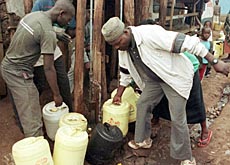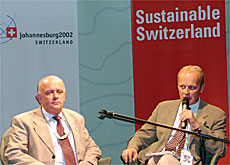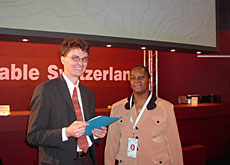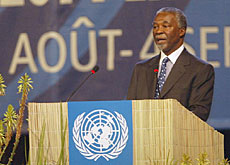Water tops agenda at Earth summit

Switzerland is pushing for an action plan at the Johannesburg Earth summit to improve access to drinking water and sanitation.
Estimates suggest that around 2.5 billion people worldwide do not have access to adequate sanitation, while 1.1 billion are without safe drinking water.
Katharina Kummer, a special advisor to the Swiss Agency for Development and Cooperation (SDC) on water-related issues and a member of the Swiss delegation in Johannesburg, says world leaders must make a firm commitment to improving access to sanitation.
“In the view of the Swiss delegation, if no target is set this would be a serious setback and we would of course be very disappointed,” Kummer told swissinfo.
The Millennium Declaration – a landmark agreement signed by heads of state two years ago – calls for a reduction by half in the number of people who do not have access to drinking water by 2015, but makes no direct mention of the related issue of sanitation.
Negotiation deadlock
But those countries pushing for sanitation targets appeared to suffer a setback on Wednesday, after the summit’s plenary session devoted to water ended without international agreement.
“A group of countries [including the United States] has problems with the acceptance of any new targets, not just for water and sanitation, because they feel that targets have already been adopted in the Millennium Declaration,” Kummer said.
Ambitious targets were originally set a decade ago at the world’s first Earth Summit in Rio de Janeiro, when world leaders pledged universal access to clean water.
But statistics suggest that the amount of fresh water available to each person on the planet is decreasing, from 17,000 cubic metres in 1950 to just 7,000 in 1995.
Half the world’s projected population of eight billion is expected to be thirsty by 2025, an estimate which has led many experts to predict that water could one day replace oil as the world’s leading source of human conflict.
Key Swiss priority
In the face of such statistics, the SDC has committed itself to financing projects in southern Africa and elsewhere in the world which include the setting up of water supplies and management of waste water.
“Switzerland is in a sense a water tower,” Kummer explains, “because we have huge water resources… so we feel we have a responsibility towards other countries less fortunate in this respect.”
“Our long experience of water management is something we can share with other countries.”
Swiss delegates were keen to show off their commitment to the topic on Thursday when the country’s information platform, “Sustainable Switzerland”, played host to a one-day presentation on water in Ubuntu Village.
One of those invited to attend the event was Abdus Sobhan, a technical manager for a company in Bangladesh – partly funded by the SDC – which specialises in the manufacture of cheap water pumps for farmers looking to irrigate their land.
“By using such pumps,” he explains, “farmers can grow more crops and get an additional income for their families.”
Water Dome
Water has not just been the topic of summit negotiations: it is also the sole focus of attention at the Water Dome, a side event which opened to the public on Thursday.
The Dome – which contains displays and information stands from some of the key global players in the sectors of water and sanitation – was officially opened by the former South African president, Nelson Mandela.
“We need global cooperation to put water high on the social and political agenda, ” Mandela said.
In a veiled reference to attempts by a number of countries to avoid setting specific targets in a final declaration, Mandela called on all summit delegates to sign up to a concrete action plan.
“Water has been placed firmly on the world agenda here in Johannesburg and you must ensure that the commitments made are monitored and followed up.”
swissinfo, Ramsey Zarifeh, Johannesburg
Switzerland is pushing for an international action plan to improve access to water and sanitation, but some countries are against setting specific targets.
The United Nations says that around 2.5 billion people worldwide do not have access to adequate sanitation, while 1.1 billion are without safe drinking water.
Half the world’s projected population of eight billion is expected to be thirsty by 2025.

In compliance with the JTI standards
More: SWI swissinfo.ch certified by the Journalism Trust Initiative



You can find an overview of ongoing debates with our journalists here. Please join us!
If you want to start a conversation about a topic raised in this article or want to report factual errors, email us at english@swissinfo.ch.